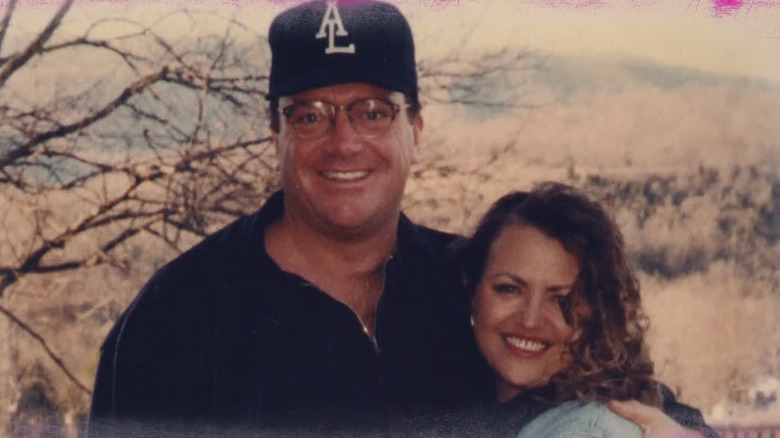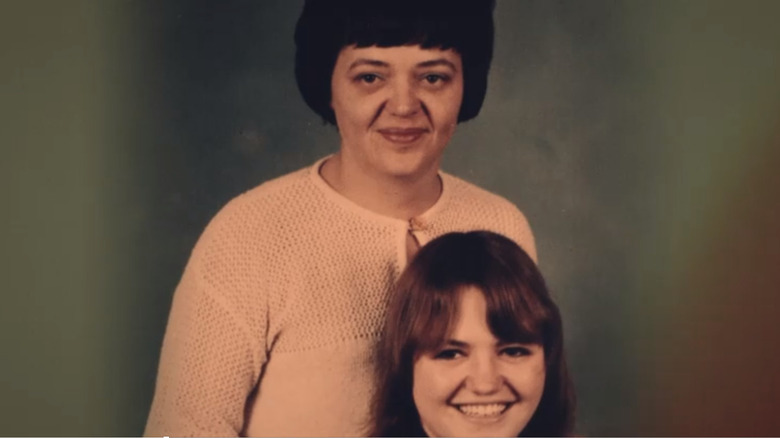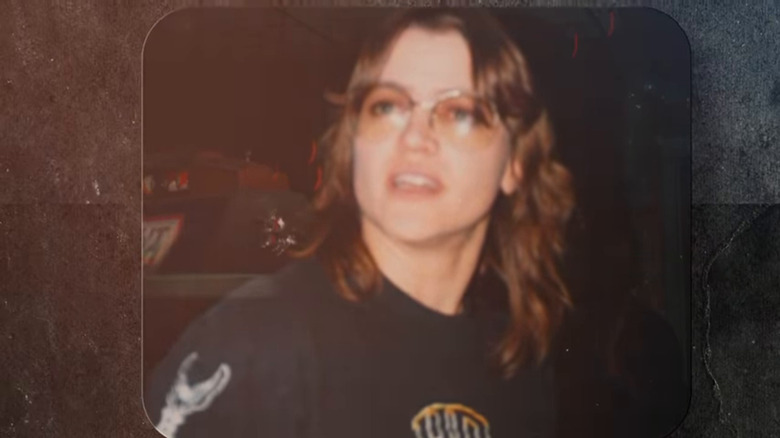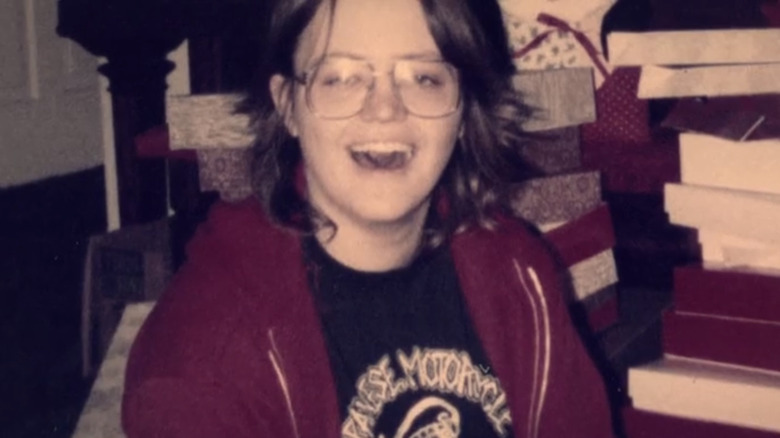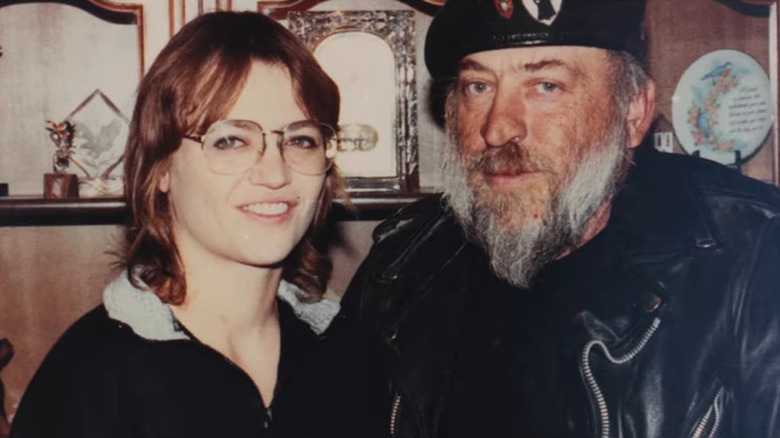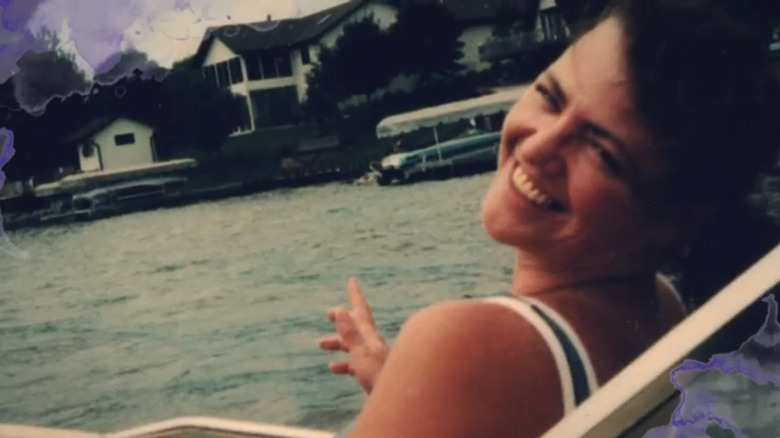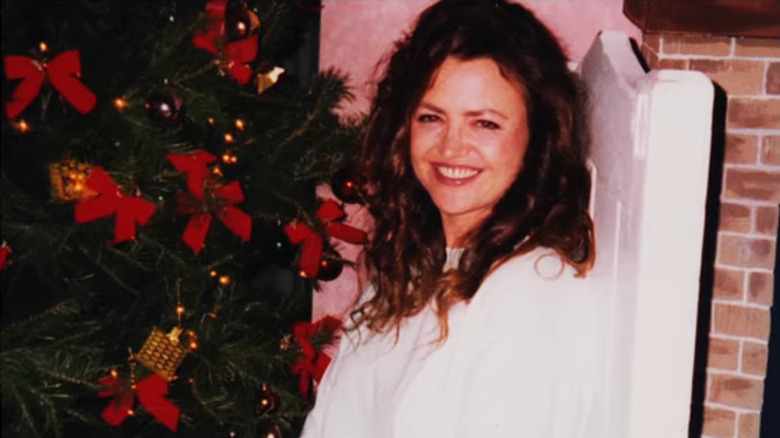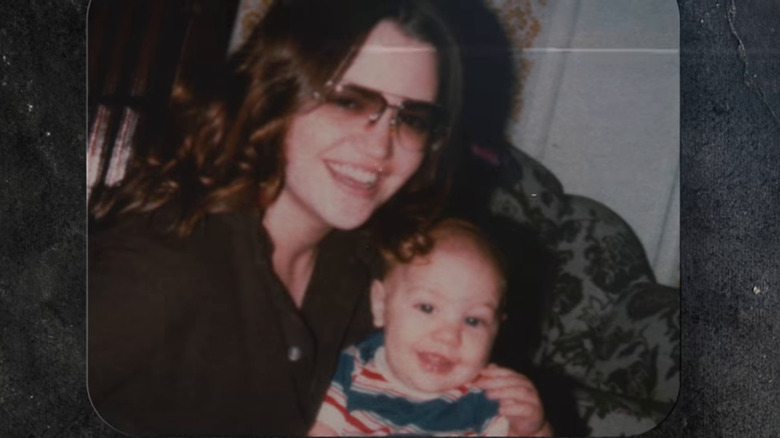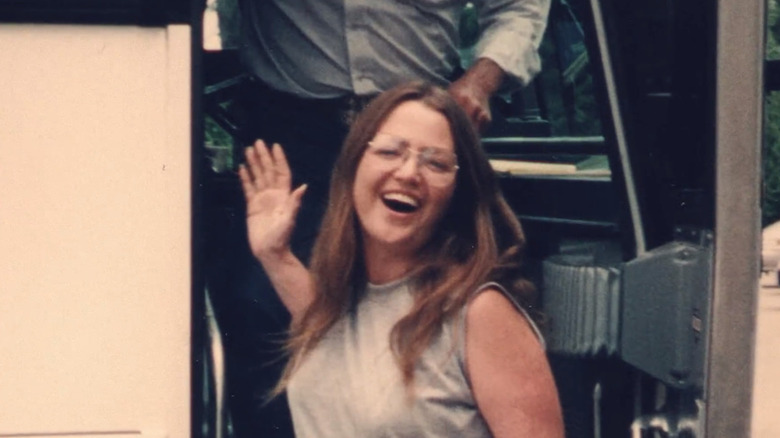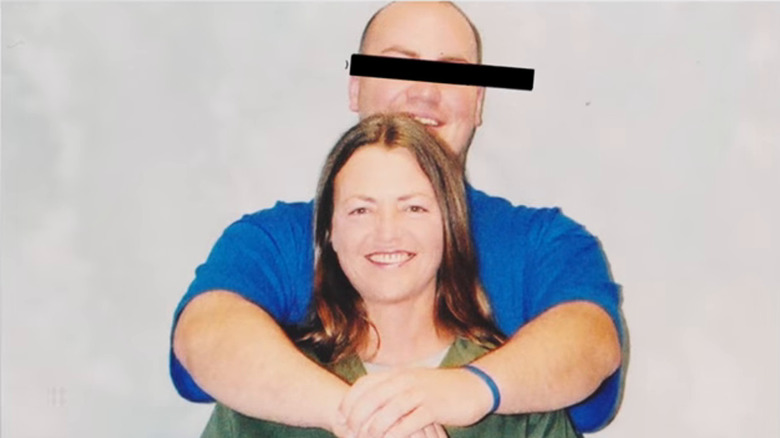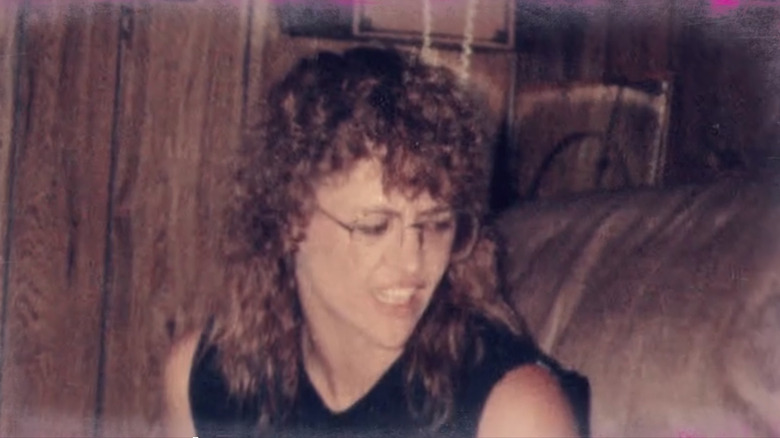The Truth About Tom Arnold's Drug Lord Sister
Sibling relationships can be among the most complicated in the world. Anyone who has a brother or sister knows the web of envy, irritation, love, and exasperation that defines your feelings towards them. Considering how much drama goes into your standard, everyday sibling relationship it's not hard to imagine how weird things can get when your brother or sister becomes incredibly famous—not to mention rich and successful.
Tom Arnold became truly famous a few decades ago when he married the comedienne Roseanne Barr, and he's put together a pretty solid career in television and film since then. But he's not the only Arnold who has achieved a high level of success, although he may not be in a mood to brag about his sister Lori. That's because Lori Arnold excelled in the highly competitive world of making and selling methamphetamine.
Like a real-life Walter White, Lori Arnold built an incredibly lucrative drug empire centered on her small hometown in Iowa. While her brother was acting in films like "True Lies," she was almost single-handedly driving a meth epidemic in the Midwest and making more money than she could spend. Here's the truth about Tom Arnold's drug lord sister.
Lori Arnold was a model student and parishioner—at first
In his book "Methland: The Death and Life of an American Small Town," author Nick Reding reports that Lori Arnold described her family as "normal and benign." As the Ottumwa Courier notes, her parents split up when she was very young, so she went to live with her father and stepmother. They provided Arnold and her siblings with a good home, and she excelled in school and went to church every week. She even sang in the church choir. It was a perfectly normal, wholesome childhood—until Lori was about 12-years-old.
That's when Arnold experienced a sudden change in her perspective, becoming in her words like "an adult." She began to rebel against the rules and expectations of her normal, boring life. She also moved in with her mother, and everything changed. Her mother was extremely permissive, and Lori Arnold lost all discipline in her life. She stopped going to church and began hanging out in bars as a teenager.
After a while, even the lax rules of her mother's house proved to be too much for Arnold. Still a teenager, she moved into a local boarding house that doubled as a notorious brothel. She began running an illegal poker game to make money, and paid her rent to the woman who owned the building by supplying her patrons with illegal drugs—all before her 18th birthday.
She began drinking at 14
Lori Arnold began living a dangerously fast life when she was still a child. After an early childhood filled with church and good grades, Lori dropped out and began a descent into substance abuse that would define the rest of her life. After leaving the stable home life provided by her father and stepmother, Lori moved in with her mother. As reported by the Ottumwa Courier, by the time she was just 14-years-old, she was a heavy drinker. That was a pretty eventful year for Lori, because it was also the first time she tried amphetamines—something she also did with her mother.
As noted by the Des Moines Register, Lori also started actively dating when she was just 14. She began seeing a 23-year-old man, and her mother forced her to marry him when she was just 15-years-old. Her famous brother, Tom, says this decision essentially ruined Lori's life. "Methland" notes that the marriage didn't last very long—by the age of 16 Lori was divorced and deeply involved with drugs and alcohol, though she did go back to school for a year. She never finished, dropping out again when she was 17.
Her brother-in-law introduced her to meth
Lori Arnold dropped out of high school for good when she was 17-years-old—already a divorcee with a serious drug and alcohol habit. As "Methland" notes, when she was 18-years-old she met her second husband, Floyd Stockdall. Arnold gave up her job working in a local bar and the couple moved into a small cabin outside her hometown of Ottumwa, and Arnold soon gave birth to their son, Josh.
Cut off from her friends at the bar and often left alone to take care of Josh, Arnold soon felt extremely isolated, and became very depressed. Stockdall was a heavy drinker and routinely became violent when he got drunk, beating Lori badly on several occasions. Her life had quickly become a pretty horrifying and depressing one.
The Ottumwa Courier reports that it was Lori Arnold's new brother-in-law who introduced her to methamphetamine for the first time. When her brother-in-law dumped a pile of what he called "biker dope" on the kitchen table, it changed her life: She'd simply never felt as good as she did when she tried meth for the first time. For someone as depressed and unhappy as Lori Arnold, it was irresistible. As the Daily Mail reports, she was soon hopelessly addicted, snorting meth "day and night" and going weeks without sleep.
Lori Arnold's husband was her drug connection
Lori Arnold was just 18-years-old when she married Floyd Stockdall and became pregnant with his son. Stockdall was 37-years-old and had just retired as president of the biker gang known as the Grim Reapers—and it's just as "Sons of Anarchy" as it sounds. As reported in "Methland," although Stockdall had retired as the club's president he was still a member, and still kept up his criminal lifestyle, dealing cocaine in Iowa and maintaining his ties with the Grim Reapers.
As noted by The Fix, Stockdall brought something else to the marriage: Meth connections. Stockdall had a link to a large methamphetamine lab in Southern California, where the meth trade was largely centered at the time. After being introduced to meth by her brother-in-law, Arnold brought some back home with her after a trip out to California with Stockdall, and introduced it to all of her friends in Iowa. Unsurprisingly for one of the most addictive substances on the planet, the drug was a huge hit, and before long she started selling meth through a local bar. Her husband's biker gang connections helped establish her supply chains, and almost overnight she was doing serious business selling what the locals affectionately called "ice."
Lori Arnold built an underground super lab
If you're looking for a high-profit business to start you could do much worse than methamphetamine. Incredibly addictive, the illegal drug is relatively easy and cheap to manufacture—if you know what you're doing and have a decent lab to work with. As "Methland" tells us, when Lori Arnold started her meth business in Iowa, she was buying her drugs from the Amezcua brothers, known as the California "Kings of Crank." But meth took off so fast in the Midwestern United States that Arnold was soon outstripping her supply.
Her solution was to start making her own meth—and she had a brilliant idea for doing so. She buried an old trailer on the grounds of the horse ranch she'd bought to launder some of her money, and set up a world-class meth lab inside it, hidden from prying eyes. Remarkably, the Amezcua brothers weren't upset about Arnold setting up her own supply chain. In fact, they loaned her their "chemist," who trained Arnold's people in making high-quality meth.
With her own super lab, Lori Arnold went full "Breaking Bad" and was soon capable of producing about 10 pounds of meth every 48 hours—worth up to $145,000 per batch. She flooded the area with so much meth she's often single-handedly blamed for the epidemic of meth addiction that swept the Midwest in the 1980s and 1990s.
She made more than $1 million a month
The illegal drug trade is a cash business, and dealing with all that cash can be a logistical nightmare. And no one knows that more than Lori Arnold.
As reported by The Sun, at the height of her meth empire Arnold was earning about $1.2 million a month, or about $300,000 a week. Since all of that money came in as cash, she soon found it very challenging to deal with. The Fix reports that she usually walked around with about $100,000 in her purse—as one does—and even tried hiding cash in the walls of her house.
Like many other high-level drug dealers, Arnold quickly realized she had to find a way to launder her money and transform that dirty cash into nice, clean assets. "Methland" details her attempts to do so, which included buying a car dealership, a bar, several other local businesses, 14 houses in the Ottumwa area, a 144-acre horse farm, and 52 racehorses—and hired the trainers, groomers, veterinarians, and jockeys required to care for them. There was no thought towards making any of these purchases profitable—the sole goal was to hide the fountain of cash pouring into Lori Arnold's life on a daily basis.
Lori Arnold was her hometown's biggest employer
If you're wondering how a woman who never completed high school and who had a serious drug addiction of her own managed to build a multi-million-dollar drug empire, there are two simple explanations.
First, as noted by "Methland," a depressed economy in Arnold's hometown of Ottumwa, Iowa meant the local police had seen shrinking budgets and manpower for years. The local authorities were simply not in any way equipped to deal with a massive operation like Arnold's, and that gave her the freedom to operate more or less openly.
Second, that depressed economy affected more than the police. The local meatpacking plant, Cargill, had not only eliminated a lot of jobs, by 1987, they'd reduced their wages from $18 an hour to just $5.60 an hour—with no benefits. As The Fix points out, with the meatpacking and railroad jobs gone and many farms going into bankruptcy, that left Arnold as the largest employer in the region. Put simply, part of her success stemmed from the economic desperation of people who didn't have many other options when it came to making a living. Unfortunately for Arnold, her own drug addiction and success went to her head, and she got very, very lazy, flaunting her ill-gotten gains and making little effort to hide where it came from.
The Feds raided her ranch in 1990
Although the local police force in Ottumwa, Iowa, was hard-pressed to do anything about Lori Arnold's growing meth empire, it was only a matter of time before she attracted the wrong kind of attention. Considering the amount of drugs she was selling (and snorting), the amount of money she was earning, and the lack of effort she put into covering her illegal tracks, the only real surprise is that she operated for so many years before Federal agencies got involved.
"Methland" explains that one reason it took so long was due to the Drug Enforcement Agency's view of meth—for years they regarded it as a minor problem, mainly pushed by biker gangs and not affecting mainstream communities. That allowed Arnold to grow her empire under the radar for years. But once the DEA realized how the meth business was changing, things moved quickly, and in 1990 Lori Arnold's horse ranch—which was also the location of her meth super lab—was raided by the FBI, the DEA, and the ATF.
Arnold, stoned out of her mind and complacent, spent the day driving around doing errands and ignoring the worried calls of her employees, who could plainly see that something was going on. She was arrested along with her husband, Floyd Stockdall, and was charged and eventually convicted of multiple counts of drug trafficking, money laundering, and several other offenses.
She tried to rebuild her empire
You might think that serving time in prison for a variety of drug-related charges would make a person reconsider their life choices, but that wasn't really the case with Lori Arnold. As noted by "Methland," Arnold served eight years of a 10-year sentence and emerged from prison in 1999. Her son had been seven when she'd been arrested, and was now 15-years-old. Instead of taking a new path in life, Arnold lost little time getting right back into the meth business—which had grown even larger and more profitable while she'd been inside.
To be fair, The Fix points out she did take a job at the Cargill meatpacking plant, working as a butcher. But this attempt to go straight may have been more about market research than anything else. While working at Cargill she observed that her co-workers—many of whom were likely former customers of hers—were using low-quality meth to get through their workdays. Arnold saw an opportunity, and set about making contact with new suppliers—the Mexican Mafia, a loose confederation of cartels and gangs south of the border.
The high quality of what she was selling helped her to once again dominate the meth market. By 2001, she was once again making so much money she had to buy new businesses to launder the money.
She was busted by an undercover cop
A few years after being released from prison, where she served eight years for charges stemming from her first meth empire, Lori Arnold had rebuilt her drug business. As The Fix explains, she made new connections with Mexican drug cartels that allowed her to bring super-high quality meth into the Midwest. Her superior product made her rich for a second time.
Arnold repeated more than her business model, however. She also repeated her mistakes. Number one, as the St. Louis Post-Dispatch notes, she once again found herself drowning in cash. That problem led her to purchase a nightclub, a new house, and a fancy car to try and launder some of it. Number two, she got careless. Just two years out of prison, it stands to reason all those purchases would be noticed by the wrong people, but Arnold was living the high life and not paying attention. In 2001, she sold four ounces of meth to a man who turned out to be an undercover cop, and she was arrested for the second time. Arnold went back to prison for seven more years as a result, finally emerging in 2008 at the age of 47.
Lori Arnold finally went straight
In 2008, Lori Arnold was closing in on 50 years of age and had spent a total of 16 years of her life in prison. Though she'd made incredible amounts of money by selling meth, there was nothing left of her former empire. As reported by The Fix, Arnold set about reclaiming her life and finally embracing a legal living. She married truck driver John Woten and began repairing her relationship with her son, Josh.
Going straight wasn't smooth sailing for Arnold. The St. Louis Post-Dispatch reports that after spending some time in a halfway house, Arnold initially landed a job in a call center in Arizona, but quickly ran afoul of a mandatory drug test, which landed her on strict probation.
But she found her way. According to the Ottumwa Courier, today Arnold lives in Ohio with Woten and works for an auto parts distribution company. She reports that although she is no longer legally required to disclose her criminal past to potential employers, she told her current job anyway when applying—and it's the first time in her life she's had a regular job with things like a 401k or allotted vacation time. Arnold also says she doesn't go to bars anymore and lives a quiet life fishing and spending time with her family.
She has zero regrets
You might think that someone who battled serious drug abuse issues, spent a significant time in jail, and lost millions of dollars would have a few regrets. Not Lori Arnold. She doesn't just look back fondly on her time as the "queen of meth," she also doesn't apologize for what many see as the damage she's done.
According to the Ottumwa Courier, Arnold doesn't regret her lifestyle of cooking, selling, and snorting meth—though she misses the money. And when she talks about her history of drug abuse she's fairly positive about it, noting only that she doesn't drink or do drugs anymore because "I'm too old for that kind of lifestyle anyway. I don't have the energy anymore."
Most disturbingly, The Fix reports that Arnold doesn't accept much responsibility for ruining the lives of her meth customers. She's quoted as saying "I had some friends who got hooked on my meth, and they went down the tubes. Yeah, I probably ruined a few lives. Sometimes I feel guilty. But I made millions of dollars and I had a blast doing it." When confronted with the next generation of meth users who grew up under her shadow, Arnold still refuses to admit much guilt, saying "Seeing them doing it makes me feel a little guilty even though I didn't have anything to do with it. They were young when I got locked up, so it's not my fault."
